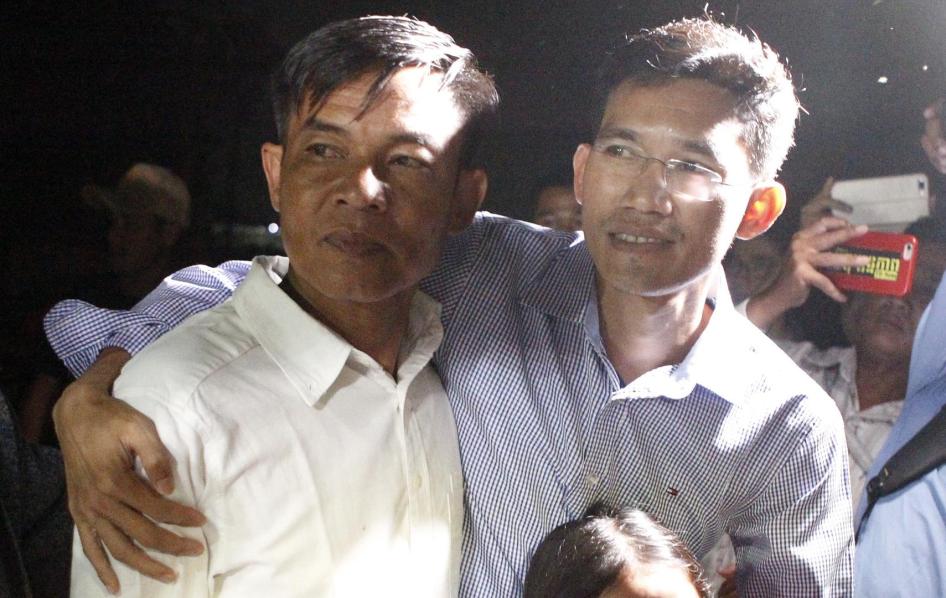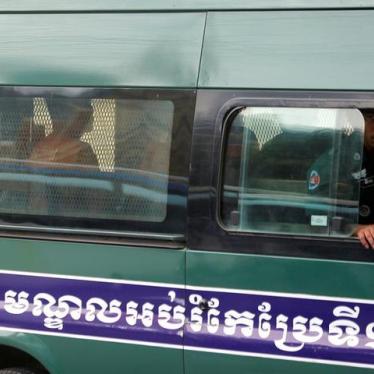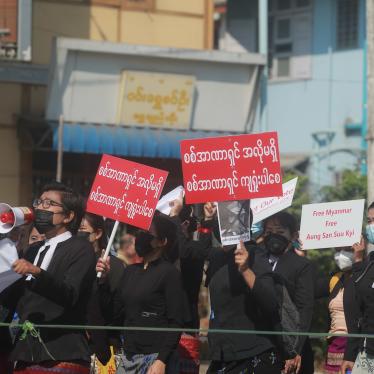(Bangkok) – The Cambodian authorities should immediately drop the politically motivated case against two ex-Radio Free Asia (RFA) journalists, Human Rights Watch said today. On July 26, 2019, the Phnom Penh Municipal Court will begin the trial of Uon Chhin and Yeang Sothearin on wholly unsubstantiated espionage charges.
“The fabricated case against the ex-RFA journalists is intended as a strike against media that dares to criticize the Cambodian government,” said Phil Robertson, deputy Asia director. “Chhin and Sothearin should never have had to face these bogus espionage charges, and all judicial restrictions on them should be lifted.”
On November 14, 2017, Cambodian authorities arrested Sothearin, RFA’s former Phnom Penh bureau office manager and a news editor, and his colleague Chhin, a former RFA cameraman. Four days later, the Phnom Penh Municipal Court charged both with supplying a foreign state with information prejudicial to Cambodia’s national defense under article 445 of the criminal code, an offense punishable by a prison term of 7 to 15 years.
On March 15, 2019, the investigating judge of the Phnom Penh court ordered the case to go to trial based on allegations that the journalists “illegally collected information for a foreign source.” On June 21, the Phnom Penh appeals court decided to keep them under judicial supervision but dropped a requirement to report to the police each month.
After their arrest, the men were held in pretrial detention and were repeatedly refused bail for nine months, until August 21, 2018, when the court released them and placed them under judicial supervision. Both journalists asserted that their bail conditions – the monthly police station visits and confiscation of their passports – prevented them from earning a living.
The arrests came two months after RFA shut down its Cambodia bureau and local newsgathering operations. RFA alleged that the government systematically harassed its reporters, compelling it to close the bureau. Cambodian authorities accused Sothearin and Chhin of illegally setting up a broadcast studio with the purpose of continuing to file news reports to RFA’s headquarters in Washington, DC. The journalists appealed the charges to the Supreme Court, but the court rejected their appeal.
RFA has had a long history of reporting on corruption, social and labor issues, human rights, illegal logging, and violations of land rights in Cambodia. In August 2017, the Cambodian authorities ordered the closure of 32 FM radio frequencies across 20 provinces, particularly stations that relayed independent Khmer language news broadcast by RFA, Voice of America, and Voice of Democracy. After the RFA bureau in Phnom Penh closed, senior officials from the Ministries of Interior and Information threatened any journalists still filing media reports to RFA, saying that they would be treated as spies.
In March 2018, prosecutors brought additional unfounded charges against Chhin and Sothearin that they produced pornography, in violation of the Law on the Suppression of Human Trafficking and Sexual Exploitation. If convicted of these additional charges, they face 16 years in prison.
On May 29, 2019, the United Nations Working Group on Arbitrary Detention concluded that the “violations of the right to a fair trial are of such gravity as to give the deprivation of liberty of Mr. Uon and Mr. Yeang an arbitrary character.” The working group also said that article 445 of the Cambodian criminal code was not in line with Cambodia’s international human rights obligations because it did not offer a definition of what constitutes an offense under that provision, leaving broad and unfettered discretion to authorities, risking abuse.
Cambodia’s press freedom and freedom of expression, both online and offline, came under broad attack by the authorities prior to the July 2018 elections. The two main independent newspapers were forcibly closed or sold to a businessman with ties to the Hun Sen government.
The independent online news portal Voice of Democracy (VOD) reported that in a letter dated July 5, 2019, the Ratanakiri provincial authorities demanded that all journalists report to them with identification and inform officials of their intentions before reporting on any stories.
On July 19, military police arrested two publishers of Facebook news livestream channels CPNTV and TN TV Online, Hun Sokha and Keo Rattana, while they were covering a community land protest in Preah Sihanouk province. On July 22, the provincial prosecutor charged them with incitement to commit a felony, incitement through the print media, and acts of violence against a property owner, for allegedly inciting protesters and committing intentional violence against the real estate agent involved in the land dispute. Five other protesters were arrested and charged with incitement. Local journalists and associations criticized the charges as a restriction on press freedom and called for their release and the charges to be dropped.
“Hun Sen’s Cambodia has effectively become a one-party state, yet the prime minister still holds journalists as scapegoats to punish those who criticize the government,” Robertson said. “Foreign governments and donors should urge the government to drop the ridiculous charges against these journalists or consider media freedom in Cambodia as dead as its democracy.”









